Georgian Lessons #11: Why I’m moving to Georgia

Georgians during the Alilo Procession on Shoba (Eastern Christmas).
And so since I began writing these Georgian Lessons, and until very recently, I had no idea that I might find myself moving there. And yet that is exactly what is going to happen. (The whole story can be found at Gravity From Above.) By the end of 2018 I will be back in Tbilisi to stay. I will finish up the editing of Gravity From Above there and then just stay to start work on a puppet and doll museum. Friends back in Alaska knew I was going back to work on my documentary last year. A few asked me if I was planning on moving to Europe. And what I would tell them, in all honestly, was that I wasn’t planning on it. But then I would add that I wasn’t planning on not moving there either. I just didn’t know. Life in Alaska seemed to be changing for me. I was open to possibilities. For a short while France appeared as a possibility. My French is passable and I have a few friends there. And in all truth I will always have France as a place to return to for certain things I can find nowhere else. But I somewhat suspected it might be Georgia calling me.

Paata a hand shadow puppeteer at Budrugana Gagra.
When I first arrived in Georgia at the end of December 2017 I was a little puzzled. I had thought I might be invited to experience more of the holiday season with some of my Georgian friends. But that didn’t really materialize. (I didn’t even know how they celebrated their holidays.) And so I found myself in a very different situation than in my first journey to Tbilisi in 2016. I was keeping myself busy. Yet I felt isolated by the very holidays I had half hoped to experience. But I need not have worried. Georgia isn’t like America that welcomes you with wide open arms immediately, only to forget about you later. It is slower sense of acceptance. And then it feels much more solid. So whether with my hosts who rented me my three month apartment in the Saburtalo area. Or my friends in puppetry. Or the many singers, dancers, and musicians of Erisioni. In each case I realized that a slower approach would work better. At Erisioni I was content to remain in the background quite a while, hardly moving, eventually becoming more and more a part of the troupe until at the end I definitely felt accepted in a fairly deep way, even though most of the members didn’t speak much English.
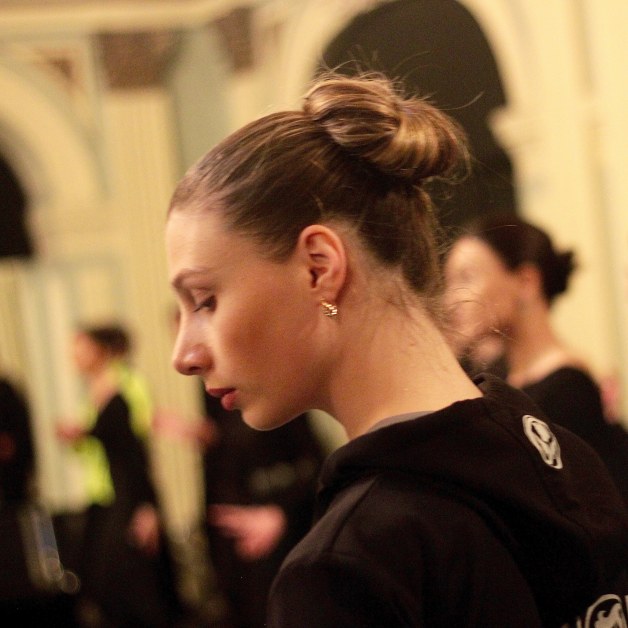
Lika Chikhelidze a graceful dancer at Erisioni.
But where I could speak English I soon discovered levels of conversation I had rarely seen in America since I was young. For you see Georgians, even the hippest of them, haven’t really been very influenced by postmodernism yet. Modernism? Yes. That desire to pull things apart, to reinvent things from zero? Yes. In a way. That’s there and in some of it’s darker forms. But the irony of postmodernism? Hardly at all. And so my conversations were all quite earnest. And with depth. Even though big budget Hollywood films, video games, electronic dance music are all there I didn’t have one conversation that could be construed as postmodern. No snarky references to traditional culture, no geeky discussions about Marvel superheroes or Star Wars, no obsessive gamers. I mean I’m guessing that just given the nature of these beasts they must be there somewhere. Maybe I just got lucky. But they just seemed to take these forms as just that cultural artifacts. But they didn’t seem to live in them. At least not yet. And I certainly wasn’t going to encourage them to do so.
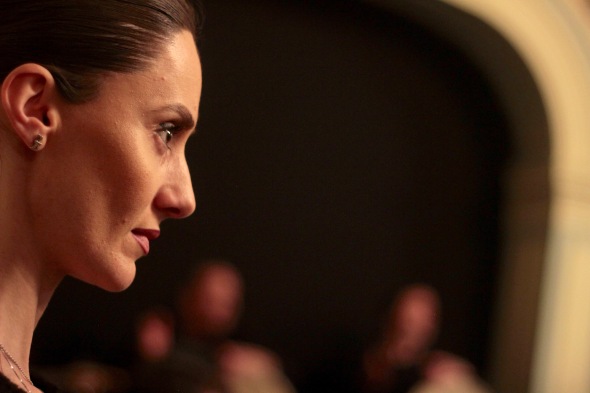
Sophiko Khachidze a noble Erisioni dancer.
The truth is that except for the youngest generation most Georgians have reminders of the serious side of life within their living memories. Older folks remember communism, people in their thirties and forties remember the civil wars of the 90’s. Nearly everyone remembers the five day war with Russia in 2008. And most still remember the electricity being very undependable. And even now there are still many problems. Reality has a way of chasing away the fluff. The West has had it so good for so long that our interests and problems reflect the strange unrealities of our lives.
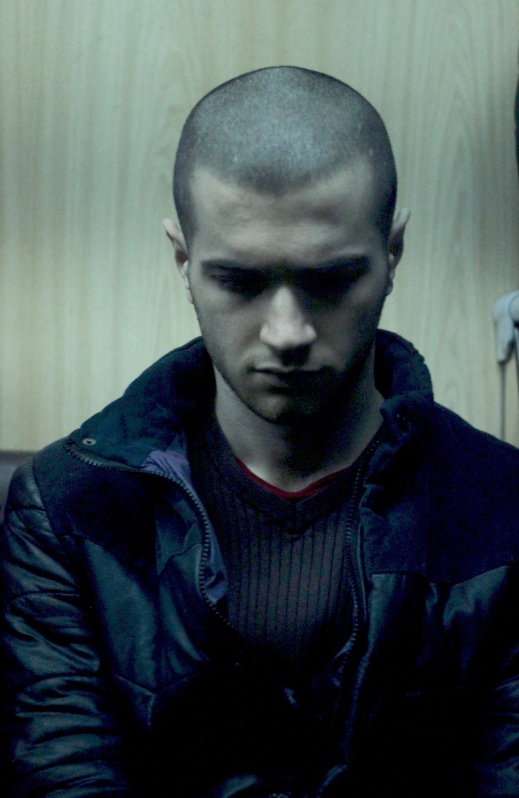
A young Georgian man sitting across from me on the metro.
Conversations in Tbilisi among my new friends reminded me of conversations I had had in the 1970’s when I was much younger. That was the last period I remember when people seemed open to dialogue with people of any sort. People would try to prove their points to each other. Which I’ve always taken as a sign of openness and care even when the disagreements were strong. The way conversation has developed in America and Western Europe after that period has led to more and more division, with the internet finally separating people from each other in near totality. Leading to our current stalemate. Not that Georgia doesn’t have people with radically different ideas. And not that those ideas are all healthy or wise. Rather I felt a kind of humility to discuss things in a way that sadly is almost impossible further west.
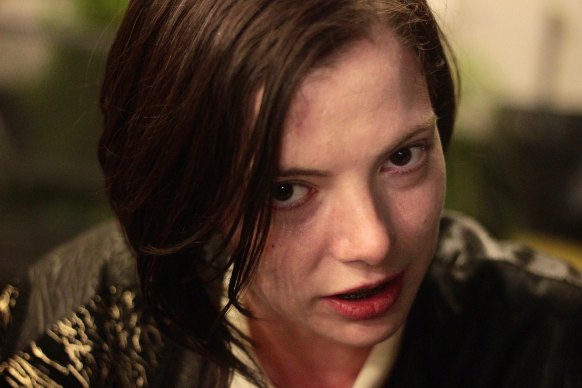
Nino my dear inquisitor.
One new friend grilled me about my ideas. And seriously. She was looking to poke holes in my arguments about the meaning of life. She was coming from a science background and had begun to adopt what I felt were premature conclusions based on neuroscience. I elaborated my thoughts as best as possible. Finally after several lengthy discussions she turned to me and said “I can’t find a problem with what you believe. You prove yourself very well.” Even among my very good friends in America who often agree with me on a foundational level I rarely find that kind of remark. (Not that I am wanting everyone to agree with me.) That is mostly because they don’t chase my rabbit all the way back to its hole. I’ve noticed that when Americans find a point of disagreement, which is inevitable, they are not willing to continue the discussion too much farther. They’ve gone over the years from a we-just-disagree sort of fatalism to an immediate ‘unfriended’ mentality. Which I do feel is a shame. Because as I have said I do remember those all night long discussions when I was younger. I remember endless conversations while working. But now say the wrong thing and that can become the end of the relationship. (There are fortunately a few exceptions to this in America. You know who you are.) And I have seen that too many times in my life. It’s a definite lack of courage. And compassion all round.
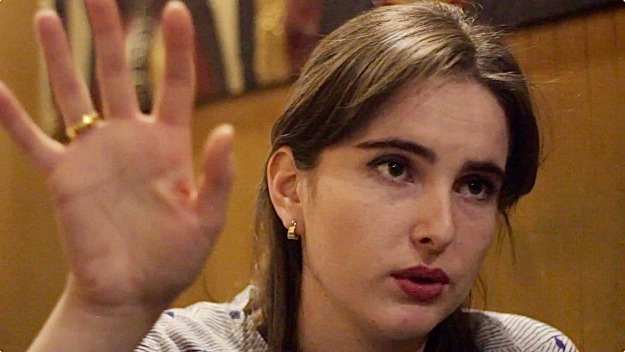
Talking with Natia Vibliani ‘star’ of the film Dede.
I’m not saying every discussion was deep. Nor am I saying Georgians have no sense of ironic humor. One of the traits I saw that really touched me was the Georgian tendency to say what they feel profoundly. When I was invited to a supra, the traditional ritual meal, I watched the toasts carefully, because I knew it would be my time to add to them soon. And Georgians take toasting at a meal seriously. And so when my turn came around several times I spoke, and was translated, giving my most thoughtful observations and hopes. I was told by the father of the friend who invited me over, that I toasted like a Georgian. And I took that as a very high compliment. Another friend musicologist John Graham told me that he had brought a couple of British men to a supra. They were incapable of speaking without irony or from the heart. And the Georgians notice things like that.
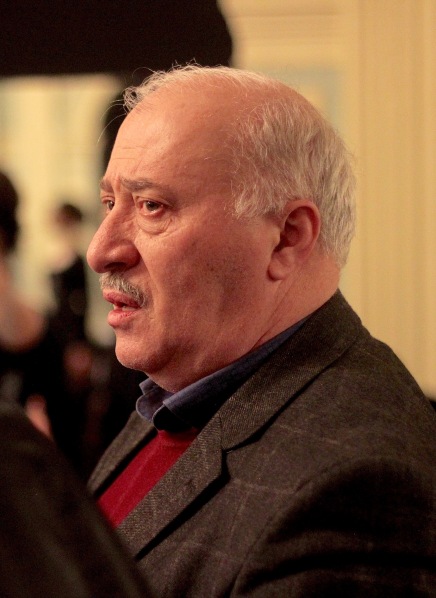
Otar Bluashvili manager and friend at Erisioni.
My discussions covered a wide range of subject matter. We spoke of the art of filmmaking, puppetry as an art, music from so many different perspectives, issues related to architecture, the meaning of emotions in Georgia, the effects of communism, the traditions of art, the problem of pollution, religious devotion pro and con. And it went on and on. And I felt at home. I could stretch out enjoying the serious possibilities of conversation that I have always thrived on.
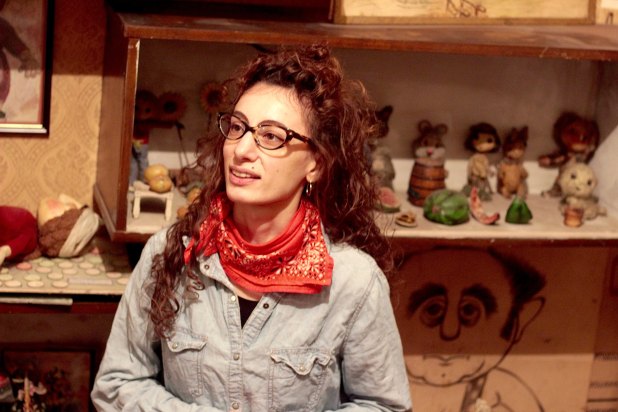
Daro Sulakauri photographer and granddaughter of the great animator Karlo Sulakauri.
It’s not that my American friends can’t talk. But there is often a distinct lack of reality, of historical understanding. Georgians are still trained to know their history quite well. Americans in these days often stop short because they can’t enter in much deeper than the surfaces. Because that is what we are trained to do in order to get along. Whenever people tell you those three things you are not supposed to talk about in American society I feel the immense poverty of our discourse. And we are happy enough when any event feels good. We are not willing to take it further to that sense of profound emotion. Of course, there are exceptions to all of this. There are deep Americans and shallow Georgians.
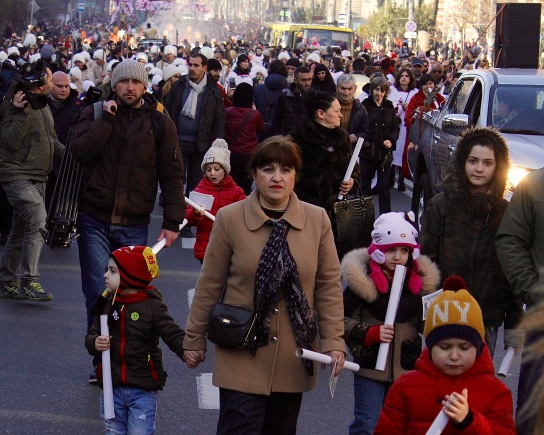
The faces of Georgians at the Christmas procession.
The conversations I had in Georgia convinced me to consider living there before I was ever offered the job which I couldn’t refuse. And I understand something very clearly in this life. Something serious in life can be accomplished by a relative handful of people who can commit themselves to a task. As opposed to the American condition that more and more resembles everyone going solo. I believe serious (and imperfect) commitments can be found in Georgia yet held with a lightness and humor while holding onto the understanding that life is very difficult. I didn’t meet one person in three months relentlessly trying to be positive. And that is an excellent thing. Not that everyone I meet will be like what I am describing. But if just a few are like that, which is what my observations show me, then I will not be spinning my wheels in the mud. And that is why I can commit myself to living in Georgia. It is hardly a perfect place. But there still is courage on a very humble level. When Georgians say hello to each other they do not say ‘Hello!’, they say ‘Gamarjoba!’ which literally translates into ‘Victory!’ And what I understand by this constant greeting is that life is hard, we’ve been through many many difficulties, including war and death, but somehow we will fight on. That attitude meshes with my own.
We’ll end our Georgian Lessons here. For now.
(Eventually I’ll have a separate site for my Georgian observations.)
Byrne Power
Haines, Alaska
7/2/2018
And remember you can help support me in this endeavor through PayPal if you wish.
You can start the Georgian Lessons series here:
https://theanadromist.wordpress.com/2016/09/17/georgian-lessons-1/
And you can find my original Georgia series here:
https://theanadromist.wordpress.com/2012/08/31/georgia-sakartvelo-%e1%83%a1%e1%83%90%e1%83%a5%e1%83%90%e1%83%a0%e1%83%97%e1%83%95%e1%83%94%e1%83%9a%e1%83%9d-1/
And don’t forget to look up my travels in Georgia over at Gravity From Above:
https://gravityfromabove.wordpress.com/






Hi Byrne,
It’s been such a long time since I had the pleasure of connecting with you in person, but I have fond memories of the time we spent together when I lived in Haines. Since then, I have greatly enjoyed your posts from The Anadromous Life, and I share your interest and passion for eastern Europe and the Slavic countries. Late last year I made a trip to Ukraine, only the second time I have visited that country (the first in 1993, by ship to Odessa), and spent time in Kiev and along the Dniepr as far south as Dnipropetrovk.
Today I noticed the following photojournal and thought of you for your involvements in puppetry over the years. No doubt you’re familiar with Royal de Luxe, which I had never heard of before seeing this story in The Atlantic. However, I see that the company was started in 1979, so they’ve been around a long time, and I’m amazed I haven’t heard of them before, even without your depth of experience in that art form.
https://www.theatlantic.com/photo/2018/10/final-appearance-giant-puppets-royal-de-luxe/572647/?utm_source=)&silverid-ref=MzEwMTU3MTkxMTQxS0
If you haven’t already left for Georgia, and if you’re passing through Juneau at some point, I hope you’ll let me know, as I’d love to connect with you again before you head overseas. And if we don’t have that chance, know that I’m always paying attention to your posts, and I’ll be eager to follow whatever you’re up to once you’re overseas.
All the best, my friend!
Larry
October 13, 2018 at 2:33 PM
I wish you well. I’m also sad that a thoughtful American is leaving. Your insights are part of our cultural tapestry. You were here having those deeper conversations so now there will be one less.
I’ve been a reader since you began the American Gothic series.
November 24, 2018 at 7:10 PM
I’m leaving because personally it is time. The finger points that way for me. So I must go.
There are a few good signs in the current culture. But many more darker ones. The fog seems to be descending in Europe as well. I will still be writing about American culture trying to understand things. So stick around Mandy. Thanks for being there.
November 24, 2018 at 8:50 PM